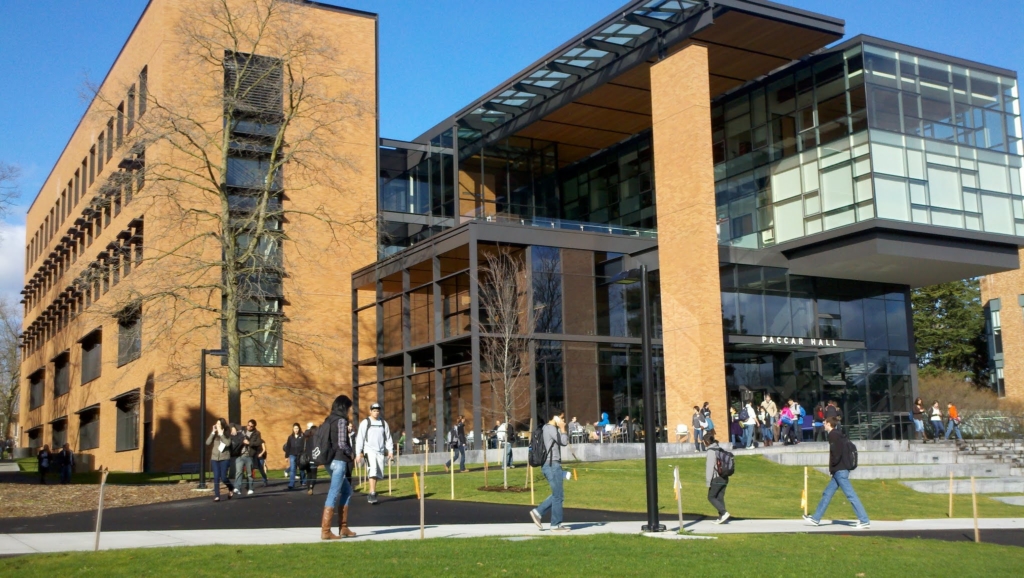
The University of Washington Foster School of Business. Courtesy photo
When thinking of the University of Washington’s location, it’s easy to get caught up in the tech potential. After all, it is the land of Bill Gates and Jeff Bezos, of Microsoft and Amazon. But even with two of the world’s biggest tech giants nearby, accounting and consulting still draw many grads from the Foster School of Business at UW. Over the past three years, Ernst & Young has hired 78 business majors from Foster — more than any other company during that time frame. Next highest is Deloitte, which has hired 68 UW business majors since 2016. Amazon, meanwhile, has hired the third-most number of graduates at 63.
Over the past three years, employment outcomes have also improved at the Foster School. In 2016, about three-quarters of graduates seeking employment had secured full-time positions within three months of graduation. This past year, that number climbed to 90%. Average salaries have also ticked up over the past three years. In 2016, those with full-time jobs three months after graduation boasted an average starting salary of $56,939. For 2018 graduates, the starting salary was up to $61,039.
While tech firms might not be hiring the most Foster graduates, Andy Rabitoy, the director of Career Services for undergrads and specialty masters programs at Foster says technology is still baked into the skill set most students possess. “I think our students have a strong technical aptitude.,” Raboitoy says. “They do really well. That could be because the majority of our students are from the state of Washington and have parents that work in tech already, so there is an influence there.”
Rabitoy has worked in university career services offices for more than 15 years — the last seven of which have been at the Foster School of Business. In a wide-ranging interview below, Rabitoy explains what graduates are currently looking for in employers and what employers are looking for in graduates. He also hits upon the difficulties of being in a two-year program in the days of early recruiting.
P&Q: Are there any recent trends you’re seeing in employment interest among your students?
Rabitoy: I think we benefit from being in a very tech-centered environment, similar to the Bay Area. So, tech is definitely a huge factor — not only in our recruiting, but also in the skill set that is required in students. And I think that is probably common across the nation. I don’t see a lot of opportunities from companies that don’t require some technical aptitude in their positions.
Our IS (information systems) option is one of the largest on the undergrad side. It’s a toss-up between that and finance, where we used to be a big accounting shop. This is another trend that you’re seeing nationwide. We still have a strong number of accounting students, but they tend to do accounting IS. The uptick in IS has benefitted not only our accounting students, but really all of our students.
You know, some of the things we’ve really been trying to influence in the career center is how can we bring more skill sets to the students that maybe is not going to be listed in the classrooms. So, let’s say they are a marketing student and they are not getting any Sequel or Tableau, is there any way for us to bring that in as a professional development workshop or something they can take, which has been helpful for our students. It’s not that they have to be experts, but increasing their awareness also increases their opportunities.
I think our students have a strong technical aptitude. They do really well. That could be because the majority of our students are from the state of Washington and have parents that work in tech already, so there is an influence there.











Questions about this article? Email us or leave a comment below.